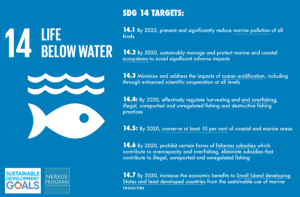Organizations Update Mangrove Commitments for Sustainable Development Goals
Has your organization made a voluntary commitment to conserve, restore, or sustainably manage mangroves?
Together through the Voluntary Commitments we can catalyze action now to protect, manage and conserve our mangroves and other ocean resources.
At the United Nations Ocean Conference in June 2017, close to 1,400 voluntary commitments for concrete action to advance implementation of Sustainable Development Goal 14 were made by governments, the UN, NGOs, academia, the scientific community, and the private sector. Mangroves comprise one “Community of Ocean Action” that focuses on catalyzing new mangrove-related commitments and follows up on the implementation of existing commitments.
The importance of mangroves to ocean health is reflected in the nearly 90 voluntary commitments to date that relate to the restoration, rehabilitation, protection and management of mangroves and associated ecosystems. These voluntary commitments reflect the vital role that mangroves play in supporting livelihoods of coastal communities, sustainable fisheries, resilience to the impacts of climate change and sequestering atmospheric CO2. Specific commitments relate to topics such as development of protected areas, reforestation, mapping, economic valuation, tourism, financing, mangrove livelihoods, climate adaptation and blue carbon. This cluster covers aspects of several SDG14 targets, including 14.1, 14.2, 14.4, 14.5, 14.7 and 14.a.

Examples of groups that have made and updated their commitments:
The Global Mangrove Alliance voluntary commitment is to take global action to increase mangrove habitat 20% over current extent by 2030.
The UNDP/GEF Small Grants Program in Pakistan updated their voluntary commitment to reflect that so far approximately 7000 acres of mangroves have been conserved and restored as part of their commitment to enhance socio-ecological landscape resilience in Pakistan’s Indus Delta.
The Bureau of Fisheries and Aquatic Resources of the Philippines has committed to improved national coastal resource management by identifying best practices in coastal municipalities including successful mangrove protection and rehabilitation programs and committing to promoting upscaling and replication.
The International Coral Reef Initiative has awarded a grant to the project “Managing mangroves for climate change regulation and other ecosystem services” in Kenya as part of their voluntary commitment “The ICRI Plan of Action 2016-2018”. Among five themes of the plan of action is encouraging financing for projects and initiatives which aim to protect and restore coral reefs, mangroves, and seagrasses to mitigate the impact of climate change.
The Samoan Ministry of Natural Resources & Environment has committed to ensuring mangroves are preserved for their social, economic, and cultural benefits to Pacific Island communities through research, capacity building, and the establishment of mangrove protected areas for mangrove rehabilitation and protection.
Brazil has committed multiple voluntary commitments to defining a comprehensive coastal-marine strategy and establishing the Brazilian Blue Fund to support the implementation of coastal conservation and climate adaptation measures, including the Brazilian Mangrove Project and a National Mangrove Conservation & Sustainable Use Progamme.